

Mounting evidence that herpes virus is a cause of Alzheimer's disease. Natural Herb Bacopa: A Multipurpose Brain Protector With Amazing Health Benefits. By Deane Alban|Be Brain Fit Bacopa benefits the brain by balancing levels of neurotransmitters and stress hormones, thus improving cognitive and mental health.

Get details on using it. The many ways that bacopa benefits cognitive and mental health are impressive. Bacopa is a foundational herbal remedy in the ancient healing traditions of both China and India. Related Article: Dr. It has been highly prized as a brain tonic for reducing stress and anxiety, boosting mental energy and clarity, and protecting the brain from aging. Alzheimer’s is a Diabetic Disorder of the Brain, Researchers Find. November 24th, 2016 By Carolanne Wright Contributing writer for Wake Up World If you have diabetes — or would like to prevent the disease altogether — current research has added yet another reason to keep blood sugar levels in check: heightened risk of developing Alzheimer’s disease.
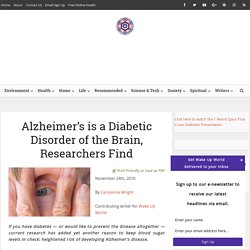
By identifying the toxic byproducts created when sugars combine with proteins or fat, researchers have zeroed in on a major culprit behind the brain damage caused by diabetes, as well as disorders of the cardiovascular system, kidney and liver. Research on Superagers (Those 80+ with great memory recall) Sheds New Light on Alzheimer’s. The team behind the Ages 2.0 study hope its findings will help inform future policy on digital inclusion and the delivery of tele-health and tele-care strategies.

By Joe Battaglia | Prevent Disease In the last few decades, over $40 billion has been spent worldwide on trying to develop a breakthrough drug treatment for Alzheimer’s, and most of these treatments are focused on clearing amyloid plaques which scientists assumed was a major contributor. Amyloid-β peptide protects against microbial infection in mouse and worm models of Alzheimer’s disease.
Novel Chemical 'Washes Away' Alzheimer's Plaque in Mice. Scientists in Korea have found a small molecule that, when added to the drinking water of mice bred to develop Alzheimer's disease, washed away the protein plaques associated with the disease and improved the mice's learning and memory functions.
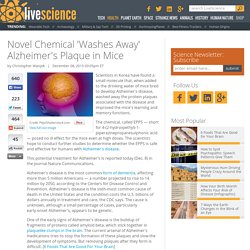
The chemical, called EPPS — short for 4-(2-hydroxyethyl)-1- piperazinepropanesulphonic acid — posed no ill effect for the mice even at high doses. The scientists hope to conduct further studies to determine whether the EPPS is safe and effective for humans with Alzheimer's disease. This potential treatment for Alzheimer's is reported today (Dec. 8) in the journal Nature Communications.
Alzheimer's disease is the most common form of dementia, affecting more than 5 million Americans — a number projected to rise to 14 million by 2050, according to the Centers for Disease Control and Prevention. Popular Drugs Linked To Dementia Even At Low Dosage. Michael T.
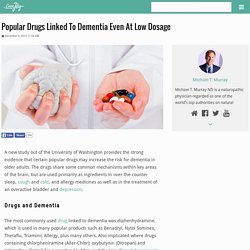
Murray ND is a naturopathic physician regarded as one of the world's top authorities on natural medicine. An educator, lecturer, researcher, and health food industry consultant, he is the author of more than 30 books, including his new book, The Complete Book of Juicing, Revised and Updated: Your Delicious Guide to Youthful Vitality (Clarkson Potter, 2014). Learn more at www.DrMurray.com. Cannabis reverses late-stage Alzheimer's. New Alzheimer’s treatment fully restores memory function. Australian researchers have come up with a non-invasive ultrasound technology that clears the brain of neurotoxic amyloid plaques - structures that are responsible for memory loss and a decline in cognitive function in Alzheimer’s patients.
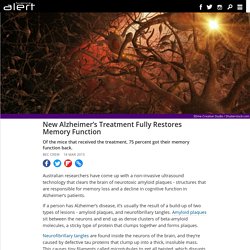
If a person has Alzheimer’s disease, it’s usually the result of a build-up of two types of lesions - amyloid plaques, and neurofibrillary tangles. Amyloid plaques sit between the neurons and end up as dense clusters of beta-amyloid molecules, a sticky type of protein that clumps together and forms plaques. Neurofibrillary tangles are found inside the neurons of the brain, and they’re caused by defective tau proteins that clump up into a thick, insoluble mass. This causes tiny filaments called microtubules to get all twisted, which disrupts the transportation of essential materials such as nutrients and organelles along them, just like when you twist up the vacuum cleaner tube. You can hear an ABC radio interview with the team here. IV administration of endothelin B receptor drug reduces memory loss, oxidative stress in Alzheimer's disease. An estimated 5.3 million people in the U.S. suffer from Alzheimer's disease (AD) -- the most common form of dementia -- and roughly 473,000 people will develop the disease in 2015.
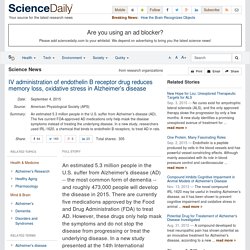
There are currently five medications approved by the Food and Drug Administration (FDA) to treat AD. However, these drugs only help mask the symptoms and do not stop the disease from progressing or treat the underlying disease. In a new study presented at the 14th International Conference on Endothelin: Physiology, Pathophysiology and Therapeutics, researchers used IRL-1620, a chemical that binds to endothelin B receptors, to treat AD in rats. Studies have shown that endothelin B receptors are important in brain development. Study: The Alzheimer's-Aluminum Direct Link. By Dr.
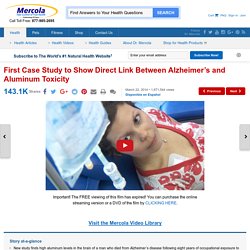
Mercola Aluminum has been long known to be neurotoxic, with mounting evidence that chronic exposure is a factor in many neurological diseases, including dementia, autism, and Parkinson's disease. However, definitive scientific proof is difficult to establish due toth the lack of longitudinal studies, as well as pushback from industries that use aluminum in their products. Despite the shortage of conclusive studies, mounting scientific evidence really leaves little room for doubt. Study: The Alzheimer's-Aluminum Direct Link. 5 Major Causes of Alzheimer's (One of them is Contracted Through Food!) Novel Magnesium Compound Reverses Neurodegeneration. Aged people are in the midst of an escalating Alzheimer's epidemic.1,2 It is now the sixth leading cause of death in the United States.3 The horrific progression of Alzheimer's disease from dementia to personal extinction afflicts between 24-30 million people worldwide.4,5 Americans account for approximately one-fifth of those cases, which are expected to triple by 2050.3,6.
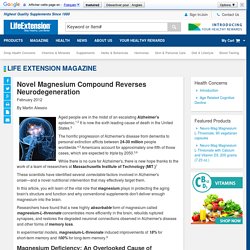
Vegetable Extract Treats Autism Better Than Drugs. Sayer Ji, Green Med InfoWaking Times The CDC says there is no treatment for autism, but this vegetable extract significantly improved the condition in a recent clinical trial.

Presently, autism spectrum disorder (ASD) is considered a condition with no known conventional treatment. According to the CDC: “There are no medications that can cure ASD or treat the core symptoms.”[1] With a prevalence rate in the U.S. estimated to be 1 in every 68 children,[2] a growing number of families are actively searching for safe, affordable and effective interventions. Thankfully, and despite the failings of pharmaceutical-based medicine, there are natural interventions that have been studied and appear to hold great promise. New Study: Can Turmeric Help With Alzheimer's Disease? I visited India for the first time in 2006, and one of my fondest memories from that trip was walking into an open-air community market.
I was overwhelmed. The sights and smells were a feast for the senses. Commerce bustled off blankets on the ground and carts packed with various fruits and vegetables. The spices were incredible in their color and fragrance. Experimental Therapy Prevents Long-Term Brain Damage in Severely Injured Mice. An experimental treatment helps restore normal brain structure and function in mice that have sustained severe concussions, and could lead to a drug that would do the same in humans, according to new research.
The brains of people who suffer from chronic traumatic encephalopathy (CTE), a progressive neurodegenerative disease that affects people such as boxers and football players with a history of repetitive hard hits to the head, are characterized by fibrous tangles of a protein called tau. It is not known how traumatic brain injury leads to these tangles, which are also found in the brains of people who suffered from Alzheimer’s disease. Though the brains of individuals who had CTE are full of tau tangles, until now it has not been clear whether this “tauopathy” is a cause or a consequence of the post-traumatic neurodegeneration, says Kun Ping Lu, a professor of medicine at Harvard Medical School, who led the new research.
He says this result confirms that it is a cause. Memory Healer. Alzheimer's breakthrough: ultrasound successfully treats disease in mice. Scientists believe they may have found a new weapon in the fight against Alzheimer’s disease – not in the form of a drug but in focused beams of ultrasound. While the approach has only been tested in mice, researchers said on Wednesday it proved surprisingly good at clearing tangles of plaques linked to Alzheimer’s in the animals’ brains and improving their memory, as measured by tests such as navigating a maze. In the past, high-energy ultrasound has been combined with injected microbubbles, which vibrate in response to sound waves, to get drugs across the so-called blood brain barrier.
But the new research, published in the journal Science Translational Medicine, is the first demonstration that ultrasound alone might have a beneficial effect on the memory-robbing condition. “Our research was very exploratory and we really didn’t expect to see such a massive effect,” Juergen Goetz of the University of Queensland in Brisbane, one of the study authors, said.
Higher Dementia Risk Linked To More Use Of Common Drugs. Medical Express Diagram of the brain of a person with Alzheimer’s Disease. Credit: Wikipedia/public domain. A large study links a significantly increased risk for developing dementia, including Alzheimer’s disease, to taking commonly used medications with anticholinergic effects at higher doses or for a longer time. Many older people take these medications, which include nonprescription diphenhydramine (Benadryl). JAMA Internal Medicinepublished the report, called “Cumulative Use of Strong Anticholinergic Medications and Incident Dementia.” The study used more rigorous methods, longer follow-up (more than seven years), and better assessment of medication use via pharmacy records (including substantial nonprescription use) to confirm this previously reported link. Aluminum and silica in drinking water and the risk of Alzheimer's disease or cognitive decline: findings from 15 year follow up of the PAQUID cohort.
Alzheimer's brain plaques 'rapidly cleared' in mice. 9 February 2012Last updated at 19:01 By James Gallagher Health and science reporter, BBC News Sections of Alzheimer's, left, and healthy brain tissue showing brain shrinkage with the condition Destructive plaques found in the brains of Alzheimer's patients have been rapidly cleared by researchers testing a cancer drug on mice. The US study, published in the journal Science, reported the plaques were broken down at "unprecedented" speed. Tests also showed an improvement in some brain function. Specialists said the results were promising, but warned that successful drugs in mice often failed to work in people.